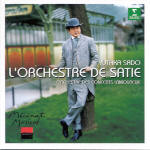There’s more to Erik Satie than a collection of short piano works, cabaret songs, and eccentric anecdotes: he wrote orchestra pieces, ballets, and even an opera, and this disc aims to bring some of this lesser known (and infrequently recorded) music to broader attention. With a mission so purposeful and well meant, it’s hard to pinpoint where the project goes wrong. With good intentions but little else Yutaka Sado leads the Orchestre des Concerts Lamoureux–a contemporary incarnation of the “house band” for a series of concerts that Satie frequented in his day. Perhaps it’s the recording’s overblown reverberation that does this charming, quirky music a severe disservice (it almost sounds as if it were recorded in a cathedral that was already too resonant and then souped up even more in post-production).
This is not to say that there aren’t wonderful, sparkling moments, such as the dark, smoky, Poulenc-predicting “rêverie” movement from Trois Petites Piêces montées, or the tight and crisp reading of the short-but-wonderful Les Pantins dansent; but these are scant minutes in a long, sprawling, and ultimately misguided collection. Of course, no Satie disc ever would be complete without the Gymnopédies (in Debussy’s reverent orchestration), yet here they’re deprived of their charm and innocence, dragged out with an inappropriate Wagnerian slowness. The performance of Parade is passable, but a clear and focused performance of this odd masterpiece can knock you sideways.
Even the photos of Sado, standing in a Parisian garden wearing a bowler hat and cane, are a cautionary tale; what would he wear for a Mozart recording? Best bet: seek out a collection on EMI called Les inspirations Insolites Erik Satie, if you can find it. It lacks a performance of Parade as well as some of the gem-like oddities found on this disc, but it does include Socrate, this composer’s practically unknown swan song.
































